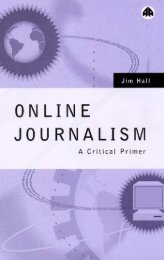Modul Mata Kuliah Journalisme Online - Ayo Menulis FISIP UAJY
Modul Mata Kuliah Journalisme Online - Ayo Menulis FISIP UAJY
Modul Mata Kuliah Journalisme Online - Ayo Menulis FISIP UAJY
Create successful ePaper yourself
Turn your PDF publications into a flip-book with our unique Google optimized e-Paper software.
call, the industry would die.<br />
Perhaps the best way to analyse the impact, and therefore any proposed threat, of reader interaction<br />
with news reports is to observe the journalistic participation of victims of global natural and terrorist<br />
disasters. For example, the Tsunami that struck the East on Christmas Eve 2004, Hurricane Katrina that<br />
struck New Orleans, America in 2005 and events such as the 9/11 bombing of the World Trade Centre in<br />
New York, America and the 07/07 London attack in England. In both sets of circumstances, evidence of<br />
the drive for normal citizens to record and broadcast the experience is apparent. Videos, still images,<br />
recorded interviews and statements provided news content to explain the situation to the watching<br />
public. Here, it can be observed that the news became not just a factual report, not even a witness<br />
statement, but an actual live recording of an event, first hand. In this, those citizens who chose to record<br />
and document their experiences placed themselves in the line of danger as would a highly trained wartime<br />
correspondents, overriding a biological drive to escape and survive, instead, they chose to record<br />
and broadcast.<br />
The worry of professional journalists lies not in recording of events, as any footage or recollection of a<br />
situation contributes to the general public awareness of world-events, but in the analysis and discussion<br />
of the happenings. The concern of maintained objectivity arises as communities reporting on local<br />
events will ultimately by affected by the consequences and therefore, even unintentionally, biased<br />
toward the situation. Andrew Keen, in his book The Cult of the Amateur raises the idea that this loss of<br />
pure truth arises “because democratization, despite its lofty idealization, is undermining truth, souring<br />
civic discourse, and belittling expertise, experience, and talent.” (Keene, 2007, p.15)<br />
Only those with professional training in remaining morally, ethically and (perhaps most importantly in<br />
the modern age) legally just, can seek to comment fairly and abstractly on a news issue. Keene likens the<br />
modern users of Web 2.0 to monkeys, typing away in “an infinite universe” (Keene, 2007, p.15),<br />
generating an endless stream of personal truths. Instead of there existing a factual, definite truth, each<br />
person takes and gives to the collective Web 2.0 knowledge, “shattering the world into a billion<br />
personalized truths, each seemingly equally valid and worthwhile”. (Keene, 2007, p.17) Truth has<br />
become an amalgamation of people's personal opinion, distributed onto a virtual storage system with<br />
no moderator, no censor, no fact-checker. The possible emergence of such a regulatory figure of<br />
organisation is discussed by Dan Gillmor, who looks at services like Technorati and Feedster, that<br />
browse and search web content and “may enable “consumers” of journalism to sort through the<br />
opinionated conversations and assemble something resembling reality, or maybe even truth” (Gillmor,<br />
2006, p.42).<br />
Hailing such tools as the pioneer of content screening, a kind of intelligent RSS, he is however, keen to<br />
point out the flaw in the system; that they are simply just tools. They cannot replace either journalism or<br />
user-generated content as they cannot assure the core values of journalism; “fairness, accuracy and<br />
thoroughness” (Gillmor, 2006, p.42), or span the full scope of the available public media.<br />
With this in mind, it can be seen that citizen journalism, whilst an exciting new medium for the delivery<br />
of news information, also has its faults. The main problem it faces is that, unlike professional journalism,<br />
it has no code of conduct or set of underlying principles that it must abide by. Richard Keeble explains in<br />
Ethics for Journalists that professional journalism bases its ethics on a multitude of various codes of<br />
practice, each with the same underlying core values of truth and respect (Keeble, 2001, pp.14-15).<br />
Citizen, democratic journalism is not the result of formal training in the rights and wrongs of informing<br />
the general public of other people's business morally and legally. In such, it often becomes a melee of
















